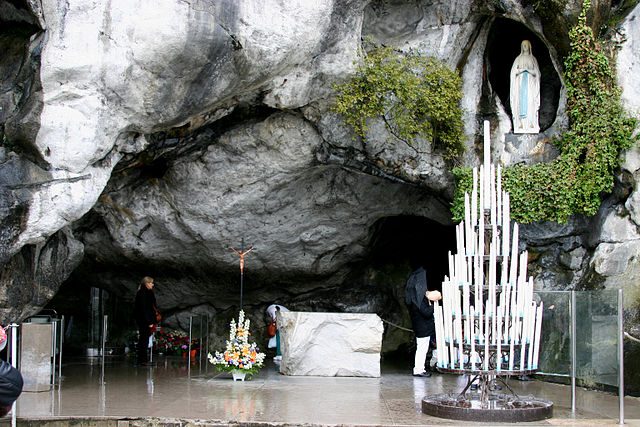
I wrote this on the Coming Home Network boards [where I moderated from 2007-2010] in response to someone saying that no one could comment on the reputed apparitions at Medjugorje unless they had been there themselves.
* * * * *
First of all, it’s wrong to say that no one can comment on a thing without firsthand experience. That’s like the pro-aborts saying that men can’t talk about abortion because they are not women. It’s a fallacy.
I agree that there can be undue skepticism (and in this case, quite a bit, I think), but on the other hand (as has been pointed out above several times), no Catholic is required to believe in any Marian apparition, no matter how firmly established. It’s a private revelation. So no one ought to get unduly dogmatic about it.
What one can say with high assurance is that a Catholic who doubts even apparitions like Lourdes and Fatima is surely in a tiny minority of orthodox Catholics, and will therefore be somewhat likely to doubt other things that he mustn’t doubt as a Catholic.
There are anti-supernaturalist biases, modernist biases, trying to be “relevant” in the eyes of secularist friends (by downplaying so-called “medieval” things in the faith, etc.), an overly skeptical bent, etc. Lots of things play into it.
On the other end of the scale, there are people who go nuts seeing “visions” in a wall stain or the cheese on their Big Mac. This gives the faith a bad name because folks think that is nuts and wacko. Balance, moderation, common sense, and the following of Church guidelines and words of wisdom are needed. Human beings have a tendency to go to extremes.
Just for the record, my own opinion on Medjugorje is identical to Rick’s [another moderator on the board]:
I don’t know whether these apparitions are true or not. I will await the definitive judgment of the Church. Until then, I rejoice with those whose faith has increased as a result of their pilgrimages, . . .
I have a great devotion to Fatima and Lourdes and not the slightest opposition to apparitions per se. But, like the Church, I am very cautious and careful regarding any alleged miracle. The Church is my guide in this matter. And we all must respect the Church’s judgment. The final word on anything doesn’t rest on “Joe/Jane Catholic”. Even if the Church eventually affirms Medjugorje (as an approved devotion and belief) in the same way that she has other apparitions, no one could say that someone must accept them. In the end, the distinction between public and private revelation is crucial.
A board participant wrote:
[W]hat people do not understand is Fatima was actually a public revelation because 80,000 people saw the miracle of the sun. You can argue all you want about this but it is true.
That’s not what the Church means by the technical description “public revelation.” Public revelation ceased in the apostolic age and the writing of the Bible. Hence, the comment of CCC, #66:
There will be no further Revelation
“The Christian economy, therefore, since it is the new and definitive Covenant, will never pass away; and no new public revelation is to be expected before the glorious manifestation of our Lord Jesus Christ.” Yet even if Revelation is already complete, it has not been made completely explicit; it remains for Christian faith gradually to grasp its full significance over the course of the centuries.
The Catechism has exactly one entry on private revelation (#67):
Throughout the ages, there have been so-called ‘private’ revelations, some of which have been recognized by the authority of the Church. They do not belong, however, to the deposit of faith. It is not their role to improve or complete Christ’s definitive Revelation, but to help live more fully by it in a certain period of history. Guided by the Magisterium of the Church, the sensus fidelium knows how to discern and welcome in these revelations whatever constitutes an authentic call of Christ or his saints to the Church.
Christian faith cannot accept ‘revelations’ that claim to surpass or correct the Revelation of which Christ is the fulfillment, as is the case in certain non-Christian religions and also in certain recent sects which base themselves on such “revelations”.
Pope Benedict XVI wrote on this topic (in 2000) before he was pope, in his document, The Message of Fatima:
[T]he teaching of the Church distinguishes between ‘public Revelation’ and ‘private revelations.’ . . . The two realities differ not only in degree but also in essence . . . The term ‘public Revelation’ refers to the revealing action of God directed to humanity as a whole and which finds its literary expression in the two parts of the Bible: the Old and New Testaments. It is called ‘Revelation’ because in it God gradually made himself known to men, to the point of becoming man himself, in order to draw to himself the whole world and unite it with himself through his Incarnate Son, Jesus Christ. It is not a matter therefore of [merely] intellectual communication, but of a life-giving process in which God comes to meet man.. . . the concept of ‘private revelation,’ . . . refers to all the visions and revelations which have taken place since the completion of the New Testament . . . The authority of private revelations is essentially different from that of the definitive public Revelation. The latter demands faith; in it in fact God himself speaks to us through human words and the mediation of the living community of the Church. Faith in God and in his word is different from any other human faith, trust, or opinion. The certainty that it is God who is speaking gives me the assurance that I am in touch with truth itself. It gives me a certitude which is beyond verification by any human way of knowing . . . such a message [private revelation] can be a genuine help in understanding the Gospel and living it better at a particular moment in time; therefore it should not be disregarded. It is a help which is offered, but which one is not obliged to use.
For further related information:
“Revelation: Public and Private” (Jimmy Akin)
“Private Revelations” (Catholic Encyclopedia)
***
(originally 11-5-07)
Photo credit: Grotto at Lourdes, France, where the Blessed Virgin Mary is widely believed by many Catholics to have appeared. Photograph by José Luiz Bernardes Ribeiro (2-15-14) [Wikimedia Commons / Creative Commons Attribution-Share Alike 3.0 Unported license]
***













